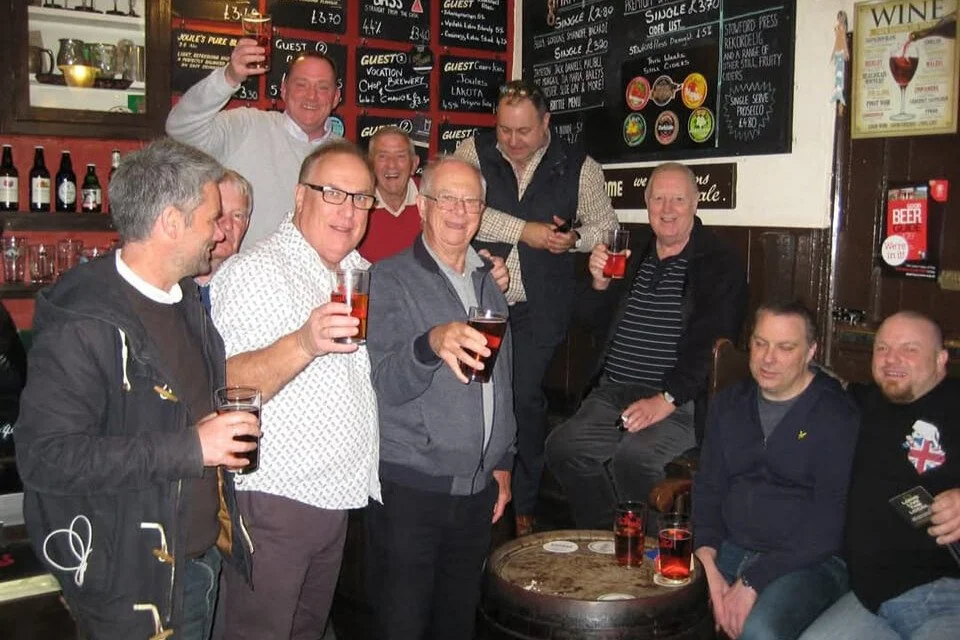Beer Cultures Here and There
I was enchanted to learn about the Honorable Order of Bass Drinkers, a half-serious, half-dada organization of 29 that has been meeting over pints in Burton for the past fifty-eight years. It exists to … well, that’s not entirely clear. Burton-based writer Ian Webster offers an anthropological account:
“The printed agenda lists the mysterious ‘Gerreminagin and BFFG’ twice, this is a call for beer and Break For a Fag and Gypsy’s. Minutes from the previous meeting are read aloud, immediately setting a tone of cheerful absurdity. Jokes fly, pints vanish, and the Treasurer admits, completely straight-faced, that his plan to invest club funds in a casino was ‘sadly thwarted.’ Fifteen minutes in, the meeting screeches to a halt when there is a delivery of pork pies.”
Even before I’d finished reading Ian’s dispatch, I had an impulse to immediately form a group like this, but a flood of melancholy that followed was my clue it was not to be. Even as the idea swirled from smoke to gossamer, trying to become substance, it collapsed: Americans don’t do clubs. I guess maybe we used to, but times have changed. More to the point, I don’t think it would even occur to an American to found a club that celebrated a single brand of very old beer. Ours is an immigrant nation of comparatively new vintage* and therefore much more interested in what’s coming next than what has already come and gone. This is not the place where such a club could reasonably be expected to survive.
It is no surprise that craft brewing started in the United States. Here I mean the very technical term of craft brewing; that is, a brewery that made a mash-up of different beer styles from around the world with little real fidelity to how they’re made. That is not a thing that was going to happen just anywhere—it took a particular context. Starting new breweries isn’t a new thing, after all—even in the 20th century. People have been starting small breweries in the UK forever—or at least since the 1960s. Those breweries made British beer, however, whether it was a revival of Scottish ales at Traquair House (b. 1965), or English ales at Selby (b. 1972) or Miners Arms (b. 1973). I doubt very seriously if any of those places thought, “Hey, maybe I’ll make a peach Berliner weisse.”
“Craft breweries” were a peculiarly American kind of thing. If you don’t have a past, you’re not bound by it. Lacking a native beer tradition—domestic lagers were functionally German beers—Americans were freed up to do what they do. We made beer styles from elsewhere, borrowing and almost immediately riffing on them. This improvisational style would become hugely influential, and it was never going to start the way it did in a traditional brewing country like Germany or Britain. Much like Americans were never going to found a club that merely venerated an old brand of beer.
I will not pretend to know the consciousness of a country where “old” is measured in millennia rather than decades. But I write this from the living room of a house that turned a hundred this year—and that counts as “old” in a city on the western fringes of a country with precious few buildings as old as Bass. I must be an old soul, though, because I long for some of that continuity. I would love to live near a church fifty generations of people have gazed at, or see battlements built to repel empires long expired. I have seen in movies and read in novels that history can feel confining, like a straitjacket. Ah, to live in a place where anything is possible! But the reverse is also true. In history resides a certain structure and safety. So Britain gets HOBD and we get milkshake IPAs. I guess you can’t have it all.
The good news is that we need not be constrained by something as insignificant as borders. That the Honorable Order of Bass Drinkers exists at all is a joyful thing—why quibble about where it’s located? On the other hand, I’m an American—I would think that, wouldn’t I?
_______________
* People have lived on this continent for thousands of years, and their memories stretch back into the very distant reaches. I want to acknowledge that I’m speaking here only about the later arrivals.


